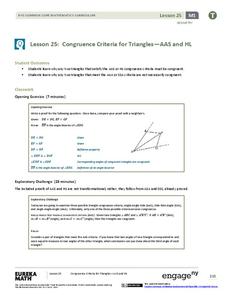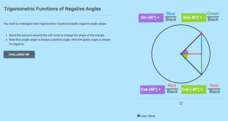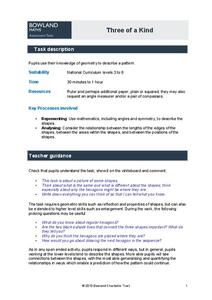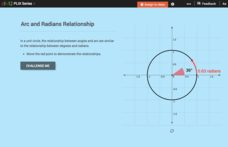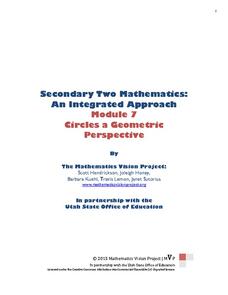EngageNY
The Angle Measure of an Arc
How do you find the measure of an arc? Learners first review relationships between central and inscribed angles. They then investigate the relationship between these angles and their intercepted arcs to extend the Inscribed Angle Theorem...
Math Mammoth
Measuring Angles
The first of two pages displays various angles as the measure of degrees of a circular arc. An explanation is written, and learners are asked to model each by holding up two pencils as the rays. The second page provides instruction on...
EngageNY
Congruence Criteria for Triangles—AAS and HL
How can you prove it? Guide classes through an exploration of two possible triangle congruence criteria: AAS and HL. Learners connect this criteria to those previous learned and also explore criteria that does not work. The activity...
Mathed Up!
Angles: Parallel Lines
Viewers are presented with seven problems with parallel lines and angle relationships and must use the given information to find the measures of specific angles. To finish, they explain their process in finding the measures in the...
EngageNY
Secant Angle Theorem, Exterior Case
It doesn't matter whether secant lines intersect inside or outside the circle, right? Scholars extend concepts from the previous instructional activity to investigate angles created by secant lines that intersect at a point exterior...
CK-12 Foundation
Trigonometric Functions of Negative Angles
When is the trigonometric value of a negative angle the same as the positive angle? Pupils compare the values of trigonometric functions for different angles and their negatives. The interactive resource provides a visual display to make...
EngageNY
Solving for Unknown Angles Using Equations II
The third activity in the series of 29 asks learners to identify types of angles to verify angle relationships. They find unknown measures using vertical, adjacent, complementary, supplementary, and 360-degree angles.
EngageNY
Solving for Unknown Angles Using Equations
They say a picture is worth a thousand words—and your pupils may agree after this instructional activity! They read a geometric description and create a diagram from that description. Their diagrams help them find unknown measures based...
Illustrative Mathematics
Are These Right?
Is that a right triangle or a wrong triangle? Young mathematicians look at eleven different shapes and use a measuring tool of their choice to determine which triangles have right angles. Consider cutting out sets of the shapes to...
EngageNY
Base Angles of Isosceles Triangles
Build confidence in proofs by proving a known property. Pupils explore two approaches to proving base angles of isosceles triangles are congruent: transformations and SAS. They then apply their understanding of the proof to more complex...
EngageNY
Unknown Angles
How do you solve an equation like trigonometry? Learners apply their understanding of trigonometric ratios to find unknown angles in right triangles. They learn the meaning of arcsine, arccosine, and arctangent. Problems include...
CK-12 Foundation
Pythagorean Theorem to Classify Triangles: Missing Angles
Learn to use the Pythagorean Theorem with non-right triangles. Pupils use the interactive to discover the relationship between the lengths of sides for acute and obtuse triangles. They compare the squares of the sides of the triangles to...
Concord Consortium
Double Pendulum
What's better than a pendulum for studying motion and periods? A double pendulum! Young physical scientists use an interactive to explore pendulum motion—times two. The resource boasts a host of parameters to change and a running graph...
Curated OER
Transformations in the Coordinate Plane
Your learners connect the new concepts of transformations in the coordinate plane to their previous knowledge using the solid vocabulary development in this unit. Like a foreign language, mathematics has its own set of vocabulary terms...
Bowland
Three of a Kind
One is chance, two is a coincidence, three's a pattern. Scholars must determine similarities and differences of a regular hexagon undergoing dilation. They look at lengths, angles, areas, and symmetry.
Willow Tree
Ratios and Proportions with Congruent and Similar Polygons
Investigate how similar and congruent figures compare. Learners understand congruent figures have congruent sides and angles, but similar figures only have congruent angles — their sides are proportional. After learning the...
CK-12 Foundation
Conversion between Degrees and Radians: Arc and Radians Relationship
How are arc lengths and radians related? An interactive resource demonstrates the relationship as pupils create arc lengths in a unit circle and compare them to the angle measurements. Questions ask individuals to build upon this...
K-5 Math Teaching Resources
Triangle Pack
With so many different types of triangles, it can be a challenge for young mathematicians to keep them all straight. Luckily this set of printable triangles is here to engage children in comparing and sorting triangles by their...
Scholastic
Study Jams! Congruent Figures
There is more to congruency than just looking similar. Learn the difference and calculate the matching angles and sides to prove the congruence between figures. Lesson has step-by-step slides and follows with an assessment.
Mathematics Vision Project
Circles: A Geometric Perspective
Circles are the foundation of many geometric concepts and extensions - a point that is thoroughly driven home in this extensive unit. Fundamental properties of circles are investigated (including sector area, angle measure, and...
Inside Mathematics
Hopewell Geometry
The Hopewell people of the central Ohio Valley used right triangles in the construction of earthworks. Pupils use the Pythagorean Theorem to determine missing dimensions of right triangles used by the Hopewell people. The assessment task...
Balanced Assessment
Sharp-Ness
Transform pupils into mathematicians as they create their own definitions and formulas. Scholars examine an assortment of triangles and create a definition and formula for determining the sharpness of the vertex angle. The groups of...
Math Solutions
Shape Sorting: Looking for Green!
Young mathematicians rotate, flip, and sort their way to an understanding of the different attributes of geometric figures. Using transparent yellow and blue shapes, children try to match congruent figures together...
K-5 Math Teaching Resources
2-D Shape Cards
Add some visual support to your elementary geometry lessons with this set of printable shape cards. From triangles and squares to octagons and nanogons, this simple resource can be used in countless ways to develop children's knowledge...


